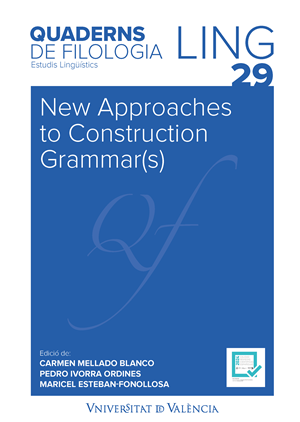"Better an octopus in hand than a hundert swimming". Snowclones in contrastive phraseology (German-Spanish): a corpus analysis
DOI:
https://doi.org/10.7203/QF.29.28795Keywords:
phraseology, constructional idioms, snowclone, Spanish, German Abstract
Abstract
In recent years, the term snowclone has been established in the field of phraseology, referring to a fixed sequence of words such as proverbs, quotes, or advertising slogans. These usually serve as a basis for substituting certain words with others for semantic-pragmatic purposes, often in a playful or humorous way. We will study the snowclones of the proverbs “Más vale pájaro en mano que ciento volando” (lit. ‘It is better a bird in hand than a hundred flying’) and “Lieber den Spatz in der Hand als die Taube auf dem Dach” (lit. ‘Better a sparrow in the hand than a pigeon on the roof’). We will provide a detailed description, both quantitative and qualitative, of their modifications in discourse and analyze their semantic, pragmatic, and communicative potential.
 Downloads
Downloads
Downloads
Published
How to Cite
-
Abstract175
-
PDF (Español)54
Issue
Section
License
Copyright (c) 2024 Ana Belén Mansilla Pérez, Herbert Holzinger

This work is licensed under a Creative Commons Attribution-NonCommercial-NoDerivatives 4.0 International License.
 Este obra está bajo una licencia de Creative Commons Reconocimiento-NoComercial-SinObraDerivada 4.0 Internacional.
Este obra está bajo una licencia de Creative Commons Reconocimiento-NoComercial-SinObraDerivada 4.0 Internacional.
Authors who publish with this journal agree to the following terms:
- Authors retain copyright and grant the journal right of first publication with the work simultaneously licensed under a Creative Commons Attribution License that allows others to share the work with an acknowledgement of the work's authorship and initial publication in this journal.
- Authors are able to enter into separate, additional contractual arrangements for the non-exclusive distribution of the journal's published version of the work (e.g., post it to an institutional repository or publish it in a book), with an acknowledgement of its initial publication in this journal.
- Authors are permitted and encouraged to post their work online (e.g., in institutional repositories or on their website) prior to and during the submission process, as it can lead to productive exchanges, as well as earlier and greater citation of published work (See The Effect of Open Access).




